It struck me recently, when I was staying at the River Mill writer’s retreat in Co. Down (it was very timely and welcome), feeling distracted, I wandered down the road for an adventure, and found Ballynoe stone circle. These stones carry many hidden stories. An over-statement, or an under-statement. When I walk through the portal at the threshold of a stone circle, I feel watched. As if I might be trespassing. I remember in Quin, Co. Clare as a child, wandering through the fields on a summer’s day, with children like myself, one called Síofra, (who I was named after,) one called Darragh, (who had one glass eye due to an accident with a scissors) and one called Ronan, who was always a bit wiser than the rest of us. We went to Quin Abbey, and found tombs with bones we could spy through the cracks. It was thrilling. We went to a passage grave, and I’ll never know which one it was, but it seems to me that it was like this one, Creevagh wedge tomb.
More than the structure of the tomb (I don’t think it was Creevagh tomb, as we did not walk that far), it was the sudden buzzing in the air of a presence enshrouding the stones. We were being ‘seen’ rather than being ‘watched’. I was enchanted. I was the kind of child who spent time in faery (tree) rings, who waited for the appearance of a faery and often left, disappointed. My friend Faith who lived in a squatter’s cottage with her sister Rohan and her parents down the Giltspur land, told me she had seen one there, several times. I still go back to that faery ring, and sit on the stone in the middle. It’s like. a big, round beetle. I remember going there with my mother, climbing up one of the oak trees, and taking a picture of her waving up at me with a little kodak camera that I took everywhere with me. I ate a bunch of primroses there, because I read in a book that if you ate primroses in may, you would see faeries.
Not long after finding the Ballynoe stone circle, I found this poem by Yeats- one that I had not found before. I’m not sure how I missed it. I waited for something to appear in the circle of stones, like the raven that appeared to Fergus….
Fergus and the Druid
Fergus. This whole day have I followed in the rocks,
And you have changed and flowed from shape to shape,
First as a raven on whose ancient wings
Scarcely a feather lingered, then you seemed
A weasel moving on from stone to stone,
And now at last you wear a human shape,
A thin grey man half lost in gathering night.Druid. What would you, king of the proud Red Branch kings?
Fergus. This would I Say, most wise of living souls:
Young subtle Conchubar sat close by me
When I gave judgment, and his words were wise,
And what to me was burden without end,
To him seemed easy, So I laid the crown
Upon his head to cast away my sorrow.Druid. What would you, king of the proud Red Branch kings?
Fergus. A king and proud! and that is my despair.
I feast amid my people on the hill,
And pace the woods, and drive my chariot-wheels
In the white border of the murmuring sea;
And still I feel the crown upon my headDruid. What would you, Fergus?
Fergus. Be no more a king
But learn the dreaming wisdom that is yours.Druid. Look on my thin grey hair and hollow cheeks
And on these hands that may not lift the sword,
This body trembling like a wind-blown reed.
No woman’s loved me, no man sought my help.Fergus. A king is but a foolish labourer
Who wastes his blood to be another’s dream.Druid. Take, if you must, this little bag of dreams;
Unloose the cord, and they will wrap you round.Fergus. I See my life go drifting like a river
From change to change; I have been many things —
A green drop in the surge, a gleam of light
Upon a sword, a fir-tree on a hill,
An old slave grinding at a heavy quern,
A king sitting upon a chair of gold —
And all these things were wonderful and great;
But now I have grown nothing, knowing all.
Ah! Druid, Druid, how great webs of sorrow
Lay hidden in the small slate-coloured thing!
William Butler Yeats
I really like this poem, its strangely theatrical, otherwordly dialogue.
Fergus follows the Druid through the rocks….
The poem begins with Fergus following the Druid among the rocks as the Druid goes through a series of metamorphoses. I was so struck by the Ballynoe stone circle, I felt I could have been in the company of Fergus, or indeed, the Druid.
My favourite lines are these:
Fergus. A king is but a foolish labourer
Who wastes his blood to be another’s dream.Druid. Take, if you must, this little bag of dreams;
Unloose the cord, and they will wrap you round.
When the Druid assumes his human form, Fergus tells him how he wishes to relinquish his rule and bestow it upon Conchubar, his stepson, the son of his beloved Ness. Maybe Fergus was preparing for his own death, and the raven that the Druid appeared as, has overtones of the Morrigan, the harbinger of death and war. Fergus would have to ensure the continuity of his line.

“In the mental evolution of humanity an age of magic preceded an age of religion, and that the characteristic difference between magic and religion is that, whereas magic aims at controlling nature directly, religion aims at controlling it indirectly through the mediation of a powerful supernatural being or beings to whom man appeals for help and protection." -James Frazer, The Golden Bough
Frazer’s Golden Bough horrified the British public in 1832. It would still horrify many, today. But it is how it is. It seems to me that that is the edifice upon which Christianity is built- to control nature and magic and the creative matrix. The serpent is, after all, the ultimate symbol of creativity and regeneration. To cast that principle out, is to cast life itself out.
“The Christian story amounts to a refusal to affirm life. In the biblical tradition we have inherited, life is corrupt, and every natural impulse is sinful unless it has been circumcised or baptized. The serpent was the one who brought sin into the wold. And the woman was the one who handed the apple to man. This identification of the woman with sin, of the serpent with sin, and thus of life with sin, is the twist the has been given to the whole story in the biblical myth and doctrine of the Fall...” - Joseph Campbell
I was brought up in an irreligious enviornment. And I was envious of my friends who were forced to go to Mass. So I actually followed them, with my big black dog Coaly on a lead (he’d drag me along). I went into the Mass occassionally, (I was around nine or ten, and I lost interest very quickly) and brazenly took the Host from the priest. I was intensly curious. I had to know. But it only seemed to be a nice little wafer that melted in my mouth and other than that, there was no divine revelation. It might have infuriated Martin Luther, of course, and he might have come down on me wrathfully since I was a little Protestant, offically. I was not supposed to believe in transubstantiation. I was only a Protestant because my Texan grandmother suggested to my mother when she was sixteen, that she become a Protestant, since my grandmother’s people had been Presbyterians. Not that she really gave a hoot but she’d sent my mother to Proddy schools here in her Irish ‘exile.’
I was fascinated by religion. My sister and godmother, Kristin, used to bring me to kirtans in the Hare Krishna centre in Dublin when I as a child. I was enthralled by the orange robes and the disciplined life, the smell of sweet rice and curry. The endless chanting to Krishna.
I was fascinated by any religion, simply because I didn’t really have one. And yet it was not in churches, nor in Krishna temples that I felt at home. I really only felt at home in the woods, climbing trees with my friends, or sitting in the bough of one, hiding and recovering from the strange family from which I came.

I hated my name as a child. Síofra. Shee-oaf-Rah. It sounded to me like a snake slithering in the grass. I was for long time the only Síofra that anyone knew because nobody seemed to know the Siofra I was named after. She was in Quin, Co. Clare, and I only saw her the odd time in summers. Some people said “What’s your name? Shiva? Are you an Indian?” and they’d laugh. I met Israelis in Fiesole in Tuscany when I was nineteen, who told me my name was a Hebrew one from the bible, and that it was a very boring, old-fashioned name in Israel, these days. Woody Allen had a Shifra Puah as a wardrobe person, and that was all I ever heard. It means ‘beautiful’ in Hebrew, and she was Moses’s midwife in the bible.
Anyway, I grew into the name because it seemed to straddle the East and the West. Besides, it meant ‘changling’ in Gaelige and I always felt I was not from here, that I must have been adopted on the sly. But I wasn’t. I was in fact from here, and my parents weren’t lying. So I began to find out why it was good to be a changeling and to not belong here too much. Being not from here but of here and not quite in here, something like that. So the fascination with the otherworld was not really nurtured by religon, but by encounters in natural places, and stones circles and forests, with certain feelings of magic, and belonging.
I wrote this poem last year about the SÍdhe (Faery) Riders of Donn Descorach. Make of it what you will. It is really driven by my fascination with the dance between this world and the other. It is the only thing that really, truly interests me, other than Time Travel.
THE SÍDHE
King Conaire rides to Tara at night.
Three horseman, red frocks, red mantles, red steeds
Shocks of red hair trailing behind them
The beauty and the strength of them bolting through the night.
Conaire said to his son, ‘who will follow them?’
Lashing his horse, spear cast between them,
They did not gain, they could not.
One red rider turned and said:
‘We ride the steeds of Donn Descorach.’
From the elf mounds.
We are dead, but alive.
The signs came: sating of raven, feeding of crow, strife, slaughter,
Sword edges wetted.
Those three red horsemen are banished, said the King.
Supreme over ghosts, though dead, they steal the living at Samhain,
Racing in, taking the best of us.
THEY LOVE LIVING MORTALS.
Their mother was Danú.
Dei Terreni, says the book of Armagh.
People of the Earth.
They give and take the milk of the cow,
They give and take ripening crops.
To them we offer poitín and oats by night,
We sate them, so no illness takes us and no crops fail.
We follow the children of Danú.
For if we don’t, we perish.
And perishing we are.
© Siofra O’Donovan, 2023
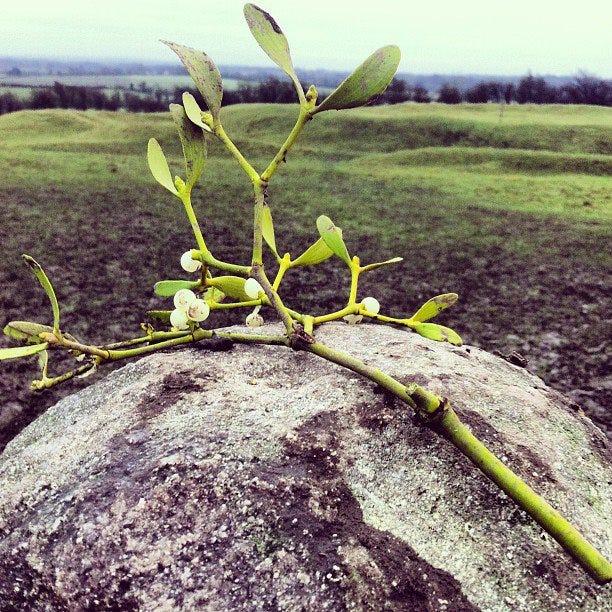
Druid. Take, if you must, this little bag of dreams;
Unloose the cord, and they will wrap you round.- WILLIAM BUTLER YEATS
FINAL NEWS BULLETIN: NEW SCULPTURE ARRIVING AT VICTOR’S WAY, ROUNDWOOD, CO. WICKLOW- FIONN THE DRUID. VICTOR’S WAY REOPENS 27TH APRIL 2024.
https://victorsway.eu/



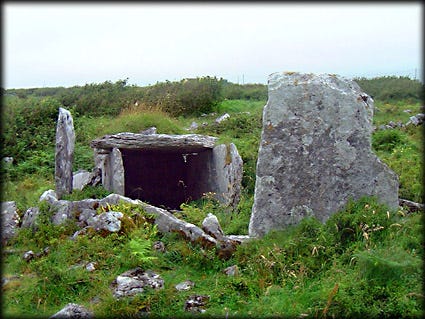
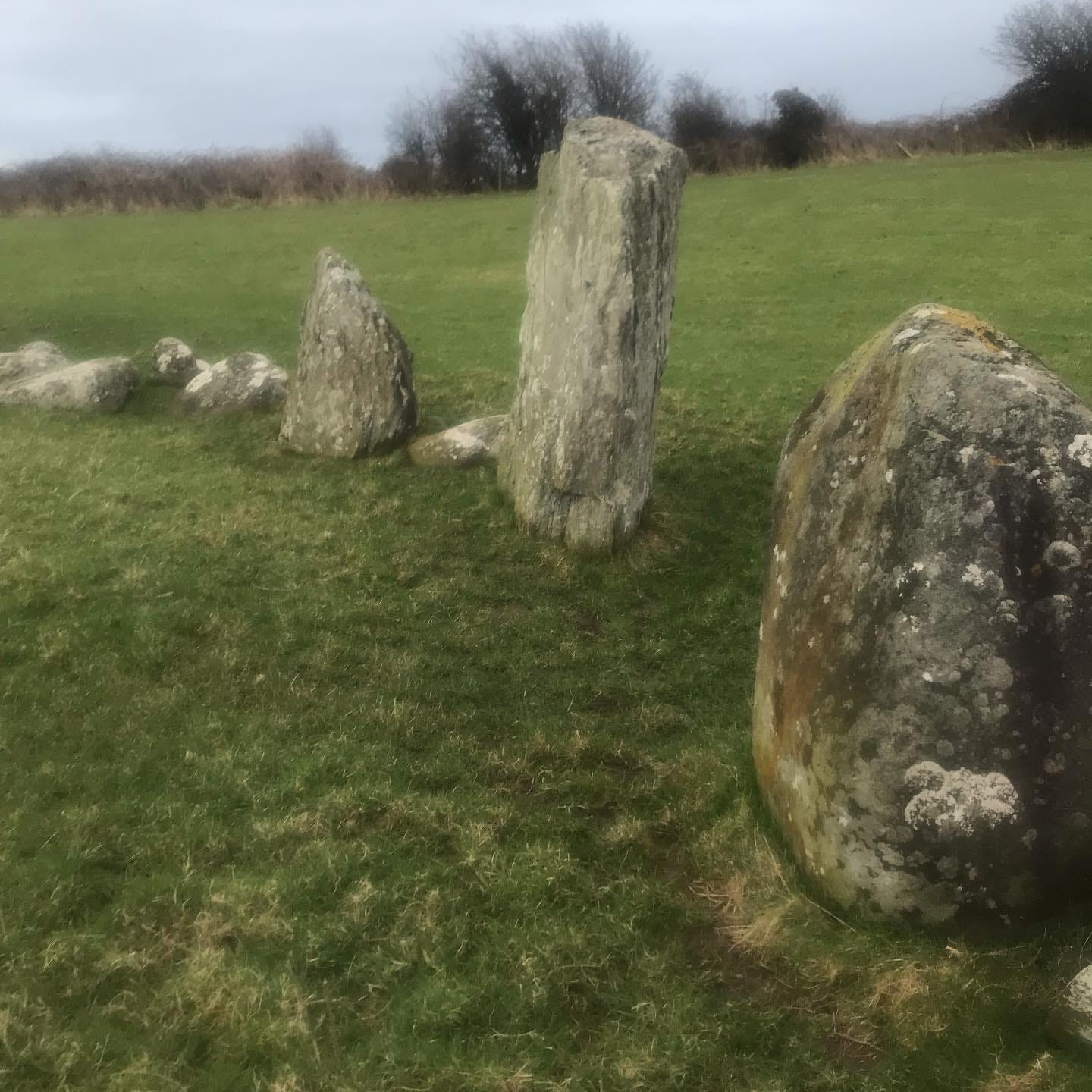
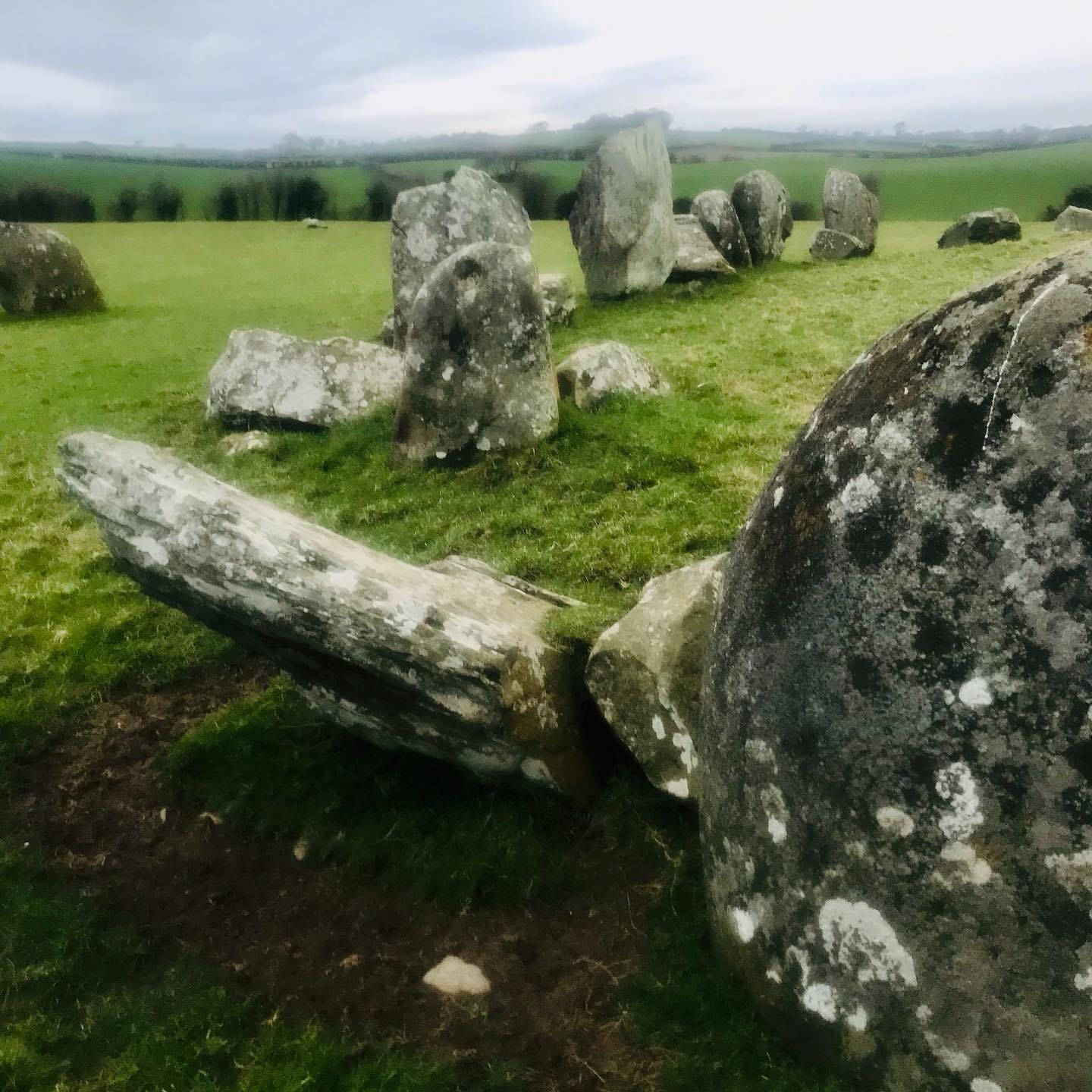
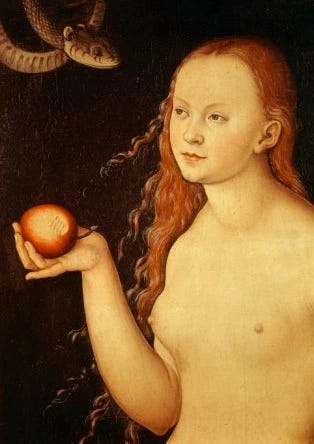

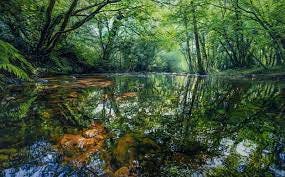
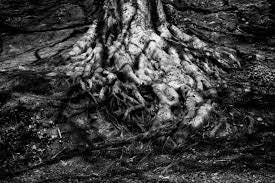


Is this the substack platform? If so you have wonderful photos and great descriptions especially those that relate to the sídh. I'm being in those woods was better and more satisfying than in most churches. Clare is likely my favourite county
Just some more points, pantheism I've reservations about, we were taught that God was all pervasive but not part of the material world, He/She is in everything for example like in boxes and cups now I've forgotten what that's called. Then there's the idea that God is not in the world at all but in heaven, the Jehovas Witnesses have that. I was pleased to see the piece from The Song of Soloman now I did some of it as part of our acting training. I can understand you getting far more religious and spiritual satisfaction from nature experiences and stone circles of which I too am keen on including Cairns. Then we have good spiritual places like Newgrange and Clonmacnoise; very satisfying materially and spiritually